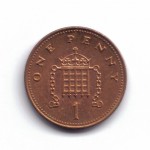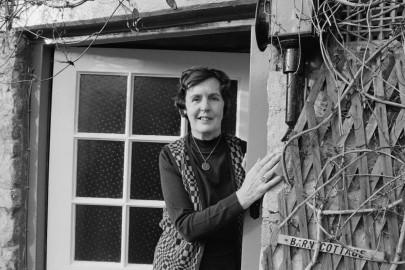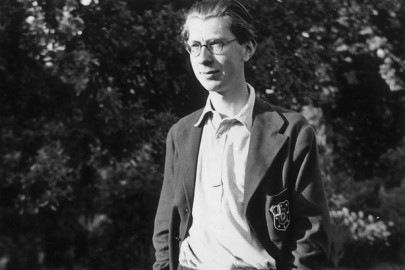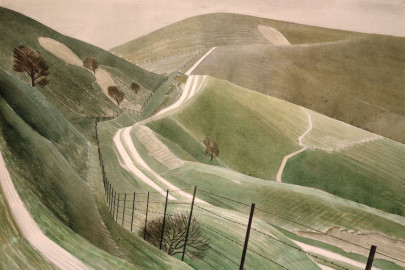My grandmother always seemed to be reading CP Snow when I was young. E L Wisty used to mention him a bit as well, although, thanks to a subtle stress shift, the author I thought he was talking about was someone called Seapy Snow.
The first CP Snow I tried was the initial volume of his sequence of novels called Strangers and Brothers. I didn’t much like it. Curiously, despite a large proportion of the text being taken up with dialogue, for me the story and its characters never came alive. Perhaps this effect was actually the product of the enormous quantity of dialogue – maybe the book didn’t feel like a novel so much as the text of a play, in need of actual living actors to make it sparkle and breathe.
Anyway, despite my lack of enthusiasm for that book, a residual sentimentality about my much loved grandmother, combined with a personal interest in the subject matter of The Masters – it is set in a college in Cambridge just before World War II and tells the story of the election of a new college master – made me decide to give this novel of Snow’s a go.
It turned out to be an interesting book, but not one that grabbed my warmest affection. That is not really a criticism – The Masters does what it sets out to do very well. What it sets out to do is portray the delicate interplay between the various participants in a struggle for power. By means of the story of a college election – which has rather too much telling and not enough showing for my taste – Snow reveals what qualities allow one person to prevail over another in a political struggle (and they are not, it has to be said, very attractive qualities in the final analysis).
What the book does not do, what its writer appears to have absolutely no interest in doing, is use language as anything other than a means to an end. There is not a moment of resonance or beauty in Snow’s prose. In The Masters, he brings things a little more to life than in the earlier book of his that I tried, but reading it I still had the definite impression that pieces were being moved about on a chessboard, rather than that a story was being told by someone who both enjoyed the richness of language and was engaged by a narrative about people he imagined really living and breathing.
On the other hand, there are real strengths in Snow’s writing. First and foremost, he is astute and perceptive about human beings. His portrait of the complex, diffident Jago allows us to see exactly why the man is as he is. Snow’s analysis of the peculiarities of human emotions is also excellent. For example, when one of the characters has a great success, Snow pictures him not as thrilled but ‘dispirited because his triumph, like all triumphs, had not been as intoxicating as he had imagined it’ (this observation, of course, undermines the entire drama, in recognising that, whoever gains the position of master, the victory will ultimately be somewhat disappointing).
Snow is especially intelligent when observing the strange twists and turns of political rivalry. ‘They were drawn close in their rivalry,’ he tells us, ‘they felt an inexplicable intimacy…they enjoyed setting themselves apart from the rest of us. It was not the first time I had noticed the electric attraction of rivalry: rivals whether competing for a job, opposing each other in politics, struggling for the same woman, are for mysterious moments closer than any friends.’ Although I have had no experience of such things, this strikes me as an interesting psychological insight.
Snow also dots the book with clever little aphorisms, my favourite of which is this: ‘Gratitude isn’t an emotion… But the expectation of gratitude is a very lively one.’ He conjures the charms of Cambridge adequately too, although without much relish. There are descriptions of candle light shining in ancient dining halls, ‘the gleam of crystal and silver’, and there is also a shrewd recognition of the university’s seductive power: ‘However impervious one might be to the feeling of past time, there were moments when one was drugged by it. It was a haze which overcame one as one walked on the stones of the first court, touched the panelling in a room such as mine, looked over the roofs to King’s: all these had been so long the same.’ Occasionally too, Snow drops tiny hints that he wouldn’t mind if we saw certain parallels between the power struggle he is describing and the rise of Hitler – ‘groups of men, even small groups, act strangely differently from individuals’ – but these are never allowed to dominate the text.
All in all the book is an excellent read, despite being somewhat dry. Its analysis of humans engaged in politics is, I suspect, brilliant. Its focus is not love and relationships between men and women – indeed, Snow gives only a page to the relationship between the master and his wife, although it could probably provide material for a novel: ‘The master might have brought happiness to many women… But somehow he had never set her free. As for her, there was a terrible story that, when the master was engaged to her, an aunt of hers said to him: ‘I warn you, she has no tenderness.’… Perhaps few husbands could have called her tenderness to the surface, and that the master had never done. She had given him children, they had struggled on for 25 years.… yet they had trusted each other; and so, that afternoon, it was her task to tell him that he was going to die’. Instead, he chooses to concentrate on an aspect of life that on a day to day basis probably affects us all far more – man’s pursuit of power.
In his other profession, CP Snow was a physicist, and perhaps it is the cool detachment of the science lab that makes his work a little chilling. All the same, I recommend The Masters. It is wise and ultimately gripping, in an icy kind of way.












As with the books of DM Thomas I’ve always been a little apprehensive of reading a cp snow novel as they have seemed dry and too’ literary’ for middlebrow me on first flick through. But I am a sucker for campus novels…
Thanks zmkc, I’ve been tempted to read more Snow since I finished The Light and Dark. While I agree that the detached, almost analytical tone of Snow’s writing makes it no surprise that the author was first a scientist, I wouldn’t describe it as dry myself. I read somewhere than the relationship described in Light and Dark is based on a real life friendship of Snow’s, and if that’s true it comes across.
Incidentally, Snow had something of a dabbler-friendly outlook on intellectual pursuits, criticizing the mutual ignorance or contempt he perceived the scientific and artistic world have for each other. His essay, The Two Cultures, is fantastically bitchy at times. Of scientists he says:
“Most of the [scientists], when one tried to probe for what books
they had read, would modestly confess, “Well, I’ve tried a bit of Dickens”, rather as though Dickens were an extraordinarily esoteric, tangled and dubiously rewarding writer, something like Rainer Maria Rilke. In fact that is
exactly how they do regard him: we thought that discovery, that Dickens had been transformed into the type specimen of literary incomprehensibility, was one of the oddest results of the whole exercise.”
…and of the artistic intellectuals:
“Once or twice I have been provoked and have asked the company how many of them could describe the Second Law of Thermodynamics. The response was cold: it was also negative. Yet I was asking something which is about the scientific equivalent of Have you read a work of Shakespeare’s. I now believe that if I had asked an even simpler question-such as, what do you mean by mass, or acceleration, which is the scientific equivalent of asking, Can you read? – not more than one in ten of the highly educated would have felt that I was speaking the same language.”
I did read The Masters and some of the other Strangers and Brothers series and wished that they had been better than they are. I am much more interested in reading a book about work politics than about love and/or marriage and/or adultery. I don’t think any of his characters come to life, though the books are readable enough in their drab way. I prefer Nigel Balchin, a contemporary of Snow’s and from a similar background – science, civil service. There’s a bit more zest in his novels.
E. L. Wisty was also my introduction to C. P. Snow 😉 Colin Dexter’s Inspector Morse books may be only detective genre fiction, but, for what it’s worth, his The Riddle of the Third Mile handles the same theme is a very entertaining manner. Thanks to Joey for those quotes! In my experience a complete set of Douglas Adams books is enough for a one of my computer bod colleagues to regard him/herself as a literary connoisseur.
Worm – I did read a DM Thomas (The White House?) on a plane – it had good bits, but bad bits too. CP Snow is much more straightforward
Joey – hilarious quotes, although, embarrassingly, I couldn’t give very articulate answers to any of those questions
Rosie – I agree about the characters and drab is exactly the right word – but then I have a memory that life in Britain was drab around the time he was writing, so perhaps he was just a terrifically skilled realist. I’m going to hunt out Balchin, of whom I am 100 per cent ignorant, thank you for the tip.
Gadjo – I shall seek out an audio book of the Morse. I can’t be bothered to read detective books but I like listening to them – harder to skip to the solution, which I can’t resist doing when they’re in paper form.